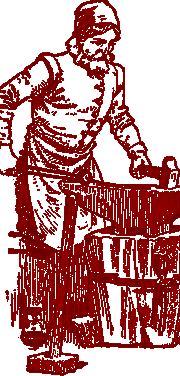
The Company Store
How ironworkers got by without money, credit or debit cards or ATMs
When new employees of an iron works and their families first arrived
at a remote rural iron plantation they usually had little money, even
for such necessities as food or clothing. Without savings or back wages
due them from their former employer and nothing to be paid them for
their new work before the end of the month, how were they to buy anything?
Credit or debit cards had not yet been thought of and even if ATMs had existed, how could one get anything out if one had put nothing in? The answer was that the iron master (the owner of the furnace) usually operated a "company store" for the convenience of both his workers and himself.
Iron plantations were usually some distance from villages or towns
with stores that sold groceries, clothing, shoes and other necessities
as well as luxuries. Workers could get to them only by missing work
and, if they were lucky, finding transportation to them. Without money
they would somehow have to arrange for credit at that store. All of
this cost more in lost wages than could be made up by lower prices.
And, of course, iron masters would not long tolerate workers who took
days off.
A company store did not much resemble today’s large, modern supermarket
bulging with a wide selection of attractively displayed goods. Usually
they were one or two rooms at the front or rear of the storekeeper’s
home. Shelves holding stock lined the walls, barrels and boxes of bulky
items such as potatoes, flour, crackers, and the like cluttered the
floor. Usually there were a few chairs near the fireplace or heating stove for customers. Liquid refreshment (cider, beer, whiskey) and tobacco (cigars
and plugs for chewing) were available. Customers checked out at a long
counter or table where their work record and store record books were
kept.
The stock of goods for sale consisted almost entirely of essentials; foodstuffs included meat, potatoes, flour, sugar, cornmeal, eggs, fresh fruit and vegetables in season. Bolts of cloth, leather belts, needles
and thread, buttons, ribbons, and bows were kept on hand for making
clothing. Crude work shoes, often made by iron workers with cobbling skills in their spare time or when furnace and forge work was slack, were for sale. Special items not on hand could be ordered—spectacles
(eye-glasses) for example, or a Bible, tobacco and whiskey, books and
pocket watches.
As soon as they were hired, ironworkers and designated family members
could make purchases at the store. Instead of paying cash for the goods
they selected, the storekeeper set up a debits and credits account for
the employee and debited the value of the purchase. When the employee’s
wages for the month were calculated they were entered as credits and
the value of the purchases subtracted. No money changed hands. The records
showed whether more was owed to the store or was paid off and a balance
left in the worker’s account. If for some reason a worker wanted
or needed cash, he usually could get it by going to the store or iron
master and asking for it. The amount was then debited to his account.
This arrangement served the interests of both working families and
ironmasters. Workers had a conveniently located source for goods they
needed and credit with which to buy them. Owners made a profit from
operating the store and did not need to keep much cash on hand to meet
payrolls; only enough to pay cash to those wanting that arrangement
and to balance accounts at settlement time with employees who were leaving
the ironworks.
The company store met a number of the social needs of the community,
too. News and gossip was exchanged there. Workmen, stopping by for a
drink, stayed to swap stories. The store's credit system offered an
easy way to raise funds by subscription. To pay the local preacher,
meet church expenses, hire a schoolmaster for the season, or help with
the medical expenses of an injured or ill fellow-worker, employees simply
authorized a debit against their account with the actual cash being
paid out by the store.
Credits to workers' accounts came from numerous sources other than
the wages they earned. Sometimes credits were given for performing extra
work for the iron master, or by growing or making something that could
be sold through the store. They could even earn credits by working or
performing services for one another, the performer receiving credits,
the recipient having his account debited.
Return to:
One-Minute Essays
 |
|

|